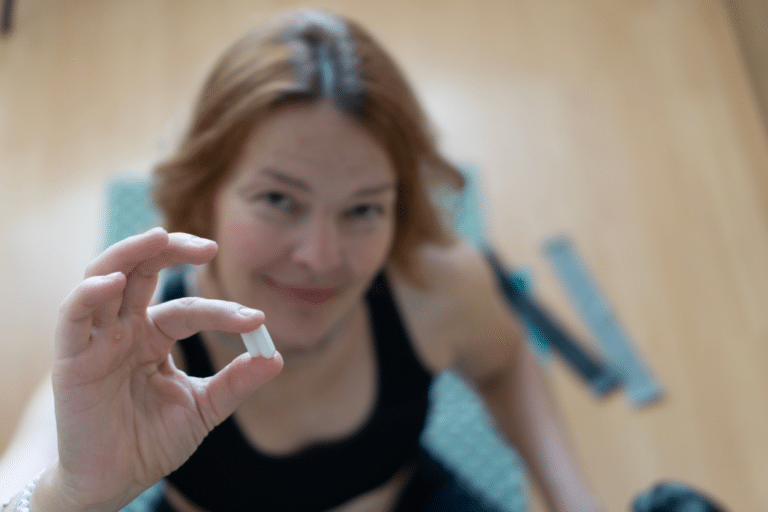If you’ve been told to avoid vaginal estrogen because of breast cancer risk or scary side effects, you’re not alone. For more than 20 years, women have been warned off one of the most effective menopause symptom treatments because of a black box warning that doesn’t reflect the actual science.
But last week, the FDA took a big step toward change. On July 17–18, a panel of menopause experts (of note, no oncologists were included) met to evaluate whether it’s time to remove the black box warning on low-dose vaginal estrogen.
Spoiler alert: the answer was a resounding yes.
Here’s what happened, what it means, and what you should know—especially if you’re navigating perimenopause or menopause and struggling with dryness, painful sex, or UTIs.
What Is a Black Box Warning—and Why Does Vaginal Estrogen Have One?
A black box warning is the FDA’s strongest label, used when a medication carries a risk of serious or life-threatening side effects. These labels are intended to protect patients—but in this case, they’ve done more harm than good.
The warning on vaginal estrogen was added in 2003 following the Women’s Health Initiative (WHI) study, which found increased risks of heart attack, stroke, and breast cancer from oral estrogen combined with progestin in older women.
But here’s the key detail:
- The WHI study didn’t evaluate low-dose vaginal estrogen.
- Vaginal estrogen delivers hormone locally—not systemically.
And yet, despite this crucial difference, all estrogen products—oral and vaginal—got lumped into the same warning.
What the FDA Panel Said This Week
During the public meeting, 12 experts reviewed decades of evidence. Here’s what they made crystal clear:
Vaginal Estrogen is Safe For Most Women
- Dr. Heather Hirsch (Brigham & Women’s Hospital) emphasized that low-dose vaginal estrogen has minimal systemic absorption and does not increase cancer or cardiovascular risk.
- Dr. Rachel Rubin, a urologist, called the warning “outdated, unscientific, and harmful”—and noted that UTIs, vaginal atrophy, and painful sex are treatable with local estrogen.
- Dr. JoAnn Pinkerton presented follow-up WHI data showing that estrogen-only therapy in younger women actually reduced risks of heart disease, breast cancer, and death.
The Panel’s Consensus
The current labeling is misleading and fuels fear-based decision-making; therefore, it needs to be revised.
Is Vaginal Estrogen Safe After Breast Cancer?
This is one of the most critical (and misunderstood) concerns.
Here’s what the science—and major medical organizations—say:
- Systemic absorption of low-dose vaginal estrogen is negligible. In most cases, it doesn’t increase serum estrogen levels beyond postmenopausal norms.
- Breast cancer survivors who experience genitourinary syndrome of menopause (GSM) and have failed non-hormonal treatments may be candidates for vaginal estrogen, with oncologist guidance.
- A 2020 JAMA Oncology study showed no increased recurrence risk in survivors using vaginal estrogen—even those on aromatase inhibitors.
- NAMS, ACOG, and ASCO all support shared decision-making and say vaginal estrogen may be appropriate with careful monitoring.
Bottom Line
If you’re a breast cancer survivor, this isn’t a blanket “yes”—but it’s absolutely not a blanket “no” either. Talk to your provider. Don’t let fear—not grounded in data—be the final word.

Want relief from the symptoms of perimenopause?
You’re in the right place.
You don’t have to suffer. I can help you balance your hormones and get your mojo back!
Why This Matters for Menopausal Women
Removing the black box warning isn’t just a regulatory tweak. It could:
- Increase access to vaginal estrogen for women who desperately need it
- Encourage clinicians to prescribe it without hesitation
- Reduce fear and misinformation in menopause care
- Empower more women to take back control of their health
Vaginal Estrogen Can Help With
- Painful sex
- Chronic UTIs
- Vaginal burning or dryness
- Bladder symptoms
- Sleep disruption from nighttime discomfort
What’s Next
The FDA hasn’t officially removed the black box warning yet, but this meeting is a major step forward. A public comment period is expected next.
In the meantime, don’t wait.
If you’re suffering from vaginal symptoms and have been told “you’ll just have to live with it,” you deserve better. Ask your provider about localized estrogen therapy. Or, better yet, work with a hormone expert who stays up-to-date on the latest science.
Final Thoughts From Me
For too long, women have been told to just deal with menopause.
Or worse—fear the very treatments that could help them feel whole again.
Let’s change that.
The science is clear. The warning is outdated. And it’s time we stopped letting misinformation make decisions about our bodies.
You have options. You have support. And you don’t have to suffer.
References
- Urology Times. Experts urge FDA to remove black box warning on vaginal estrogen. July 18, 2025.
- Women’s Health Magazine. The FDA May Finally Remove the Black Box Warning on Hormone Therapy. July 17, 2025.
- JAMA Oncology. Vaginal Estrogen and Breast Cancer Recurrence Risk. 2020.
- North American Menopause Society (NAMS). 2022 Position Statement on Hormone Therapy.
- American College of Obstetricians and Gynecologists (ACOG) Practice Bulletin No. 141.
- American Society of Clinical Oncology (ASCO) Guidelines: Menopausal Symptoms in Cancer Survivors.
- Contemporary OB/GYN. Experts urge FDA to revise boxed warnings.
- YouTube. FDA Expert Panel on Hormone Replacement Therapy for Women. July 17, 2025.
Dr. Anna Garrett is a menopause expert and Doctor of Pharmacy. She helps women who are struggling with symptoms of perimenopause and menopause find natural hormone balancing solutions so they can rock their mojo through midlife and beyond. Dr. Anna is the author of Perimenopause: The Savvy Sister’s Guide to Hormone Harmony. Order your copy at www.perimenopausebook.com.
Dr. Anna is available for 1-1 consultation. Find out more at www.drannagarrett.com/lets-talk




